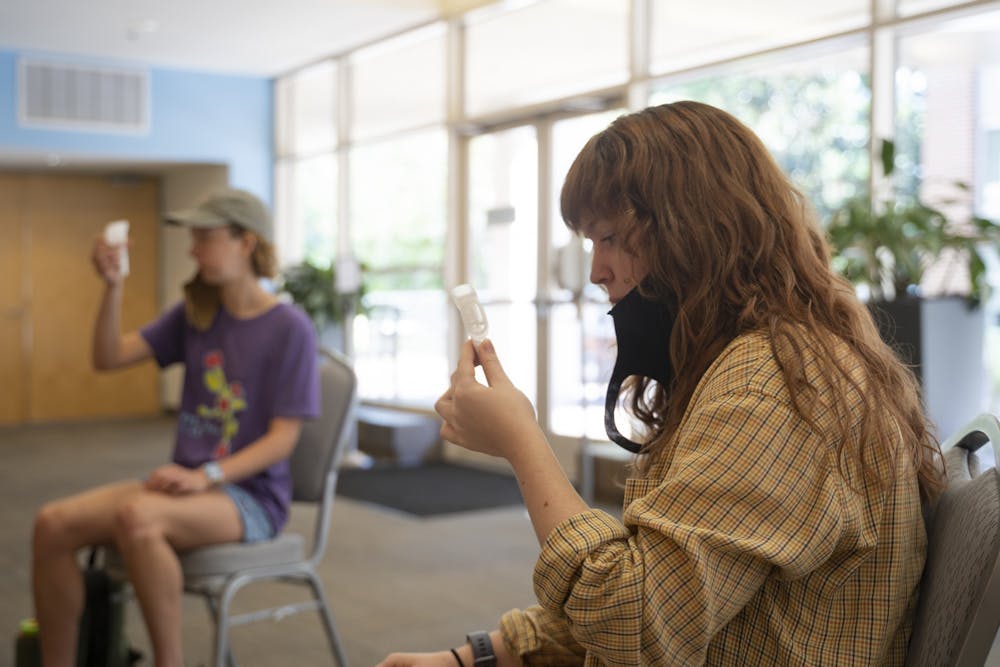- Students must test twice a week if they take classes on-campus, live in a residence hall, Granville Towers or off-campus with 10 or more people.
- Students must test once a week if they live off-campus in the Chapel Hill and Carrboro area, even if they are fully remote and do not access campus.
- Graduate, professional and post-doctoral students who will be on campus must test once a week. There is an exception for graduate students in programs where daily symptoms are monitored.
Challenges in getting COVID-19 tested
Some students, however, are finding it difficult to meet UNC’s testing requirements. Some cannot afford to take a test, don’t have adequate testing sites in their area or fear COVID-19 exposure at testing sites.
Students who are facing challenges in getting tested can submit their concerns, individual circumstances and questions through a form sheet on the Carolina Together Testing Program’s web page.
A member of the program’s staff is expected to respond within 24 to 48 hours after submitting the form. They will be able to provide available resources and alternative solutions for students. Conversations can take place over the phone or via email, Rieckenberg said.
“We believe students should be able to access testing and access resources fairly easily,” Rieckenberg said. “Sometimes it's just about being able to make sure they get connected to the right information because we recognize this information is all over the place and is sometimes a little more challenging to find.”
In some cases, UNC can waive the prior to arrival testing requirement for those who cannot access a test, depending on the student’s individual circumstances, she said.
Rieckenberg said exceptions are rare and will only be granted if absolutely needed. She said she expects most students will have their issues resolved through resources and alternative solutions.
UNC can also provide financial assistance or help students find low-cost or free testing options in their area if they cannot afford to pay for a test, Rieckenberg said.
If a student cannot comply with prior to arrival testing this term, UNC will work with students to determine other options, including whether that student could get tested whenever they return to the Chapel Hill-Carrboro area.
Concerns about testing
Flannery Fitch, a senior studying American history, said she is worried about on-campus testing because of COVID-19 exposure. She rarely leaves her off-campus apartment in Chapel Hill, mainly just to get groceries.
To get the day's news and headlines in your inbox each morning, sign up for our email newsletters.
“I honestly don’t think they ever considered that forcing students to get weekly testing might actually endanger those students unnecessarily,” Fitch said.
Junior Rahne Hartman spoke to a UNC Medical Center physician after filling out UNC’s questionnaire form. She said one of her primary concerns is being exposed to COVID-19 at a UNC testing site.
“I heard that it was very chaotic,” Hartman said. “But being told that the number of people that would be inside [the testing sites] would be limited and that it will be distanced did feel reassuring to me. I feel that the largest problem is that the University isn't being super transparent with all of the information.”
According to the Carolina Together website, testing sites will have one-way flow, will ensure proper spacing to limit interaction and will provide supplies to maintain hand hygiene.
She said she felt students who are fully remote this semester shouldn’t be required to test on campus.
“For those of us who are following guidelines, that, then we have to deal with everything,” Hartman said.
Free COVID-19 testing options in North Carolina
Throughout North Carolina, free testing is offered in several counties on a daily basis. Some locations require identification prior to getting tested, according to the North Carolina Department of Health and Human Services’s website. A list of free testing centers can be found here.
The state also provides testing locations at Federally Qualified Health Centers, a group of community-based health care providers that provide medical services in underrepresented areas. Find available locations here.
Testing sites in Orange County do not require a government ID or proof of insurance.
“We wanted to lower all barriers of entry,” said Orange County Health Department Public Information Officer Kristin Prelipp.
Those in the county can test for free at Whitted Human Services Center, 300 W. Tryon St., and the R7 Parking Lot at 725 MLK Blvd.
@Heidi_perez02
university@dailytarheel.com




